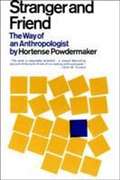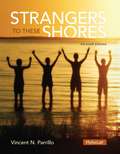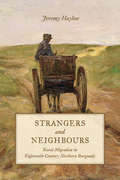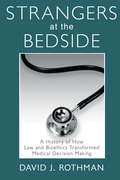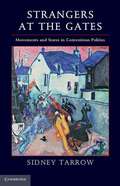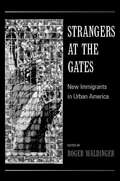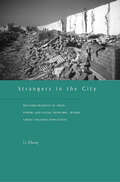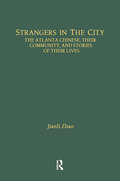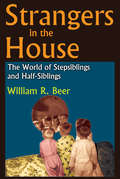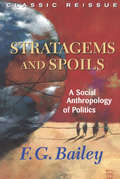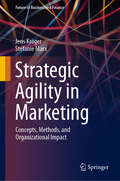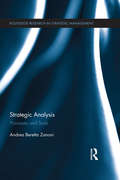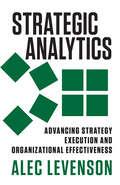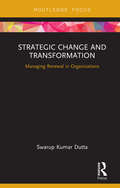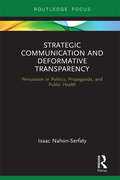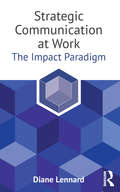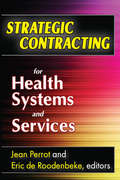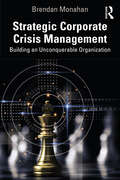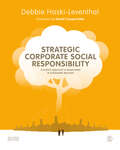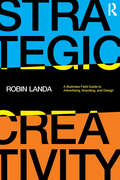- Table View
- List View
Stranger and Friend: The Way of an Anthropologist
by Hortense Powdermaker"Her book is all about people. . . . The publishers say of it that 'field work in its personal and objective dimension is placed under a kind of microscope. The book is a must for all field workers in the social sciences. ' That claim does not seem to me excessive. " --Edmund Leach, New York Review of Books "There are few books which are as informative of what it means to be a field-worker in social science as Hortense Powdermaker's Stranger and Friend. This book should be must reading both for scholars and students. " --Seymour M. Lipset, Harvard University "Stranger and Friend is a passionate plea for anthropology as a human discipline as well as a science, as an all-engrossing life experience as well as a profession, and increasingly as a subject in the curriculum of graduate and undergraduate studies. " --Margaret Mead, American Museum of Natural History "This is just the kind of book needed in anthropology today. It tells objectively, but in warm and human terms, how important research was done. It contributes to methodology and to the history of the science of anthropology. " --Charles Wagley, Columbia University" This is an essential book for anyone interested in the problems of an anthropologist at work. " --Cornelius Osgood, Peabody Museum of Natural History
Strangers To These Shores (Eleventh Edition)
by Vincent N. ParrilloExamines U. S. racial and ethnic relations from a socio-historical perspective Strangers to These Shores, 11/e, offers a conceptual and theoretical overview of one of the most interesting and dynamic fields of study - race and ethnic relations. Racial issues are examined through different sociological perspectives, giving students a basis for examining the experiences of different minority groups. Readers will not only see how racial and ethnic groups came to be, but also how they are changing and how they will continue to change in the future.
Strangers and Neighbors
by Andrea M. VoyerThe city of Lewiston, Maine, has struggled since its mills began closing in the 1950s. In the new millennium Lewiston acquired a new identity as 'Maine's Mogadishu'. Beginning in 2001, substantial Somali immigrant settlement gave Lewiston the largest per capita Somali population in the United States and sparked controversies and collaborations that redefined the city. In Strangers and Neighbors, Andrea M. Voyer shares five years of observations in the city of Lewiston. She shows how long-time city residents and immigrant newcomers worked to develop an understanding of the inclusive and caring community in which they could all take part. Yet the sense of community developed in Lewiston was built on the appreciation of diversity in the abstract rather than by fostering close and caring relationships across the boundaries of class, race, culture, and religion. Through her sensitive depictions of the experiences of Somalis, Lewiston city leadership, anti-racism activists, and even racists, Voyer reveals both the promise of and the obstacles to achieving community in the face of diversity.
Strangers and Neighbours
by Jeremy HayhoeThough historians have come to acknowledge the mobility of rural populations in early modern Europe, few books demonstrate the intensity and importance of short-distance migrations as definitively as Strangers and Neighbours. Marshalling an incredible range of evidence that includes judicial records, tax records, parish registers, and the census of 1796, Jeremy Hayhoe reconstructs the migration profiles of more than 70,000 individuals from eighteenth-century northern Burgundy.In this book, Hayhoe paints a picture of a surprisingly mobile and dynamic rural population. More than three quarters of villagers would move at least once in their lifetime; most of those who moved would do so more than once, in many cases staying only briefly in each community. Combining statistical analysis with an extensive discussion of witness depositions, he brings the experiences and motivations of these many migrants to life, creating a virtuoso reconceptualization of the rural demography of the ancien régime.
Strangers at the Bedside: A History of How Law and Bioethics Transformed Medical Decision Making (Social Institutions And Social Change Ser.)
by David J. RothmanDavid Rothman gives us a brilliant, finely etched study of medical practice today. Beginning in the mid-1960s, the practice of medicine in the United States underwent a most remarkable--and thoroughly controversial--transformation. The discretion that the profession once enjoyed has been increasingly circumscribed, and now an almost bewildering number of parties and procedures participate in medical decision making.Well into the post-World War II period, decisions at the bedside were the almost exclusive concern of the individual physician, even when they raised fundamental ethical and social issues. It was mainly doctors who wrote and read about the morality of withholding a course of antibiotics and letting pneumonia serve as the old man's best friend, of considering a newborn with grave birth defects a "stillbirth" thus sparing the parents the agony of choice and the burden of care, of experimenting on the institutionalized the retarded to learn more about hepatitis, or of giving one patient and not another access to the iron lung when the machine was in short supply. Moreover, it was usually the individual physician who decided these matters without formal discussions with patients, their families, or even with colleagues, and certainly without drawing the attention of journalists, judges, or professional philosophers.The impact of the invasion of outsiders into medical decision-making, most generally framed, was to make the invisible visible. Outsiders to medicine--that is, lawyers, judges, legislators, and academics--have penetrated its every nook and cranny, in the process giving medicine exceptional prominence on the public agenda and making it the subject of popular discourse. The glare of the spotlight transformed medical decision making, shaping not merely the external conditions under which medicine would be practiced (something that the state, through the regulation of licensure, had always done), but the very substance of medical pract
Strangers at the Gates: Movements and States in Contentious Politics
by Sidney TarrowPlaces social movements in the broader arena of contentious politics in relation to states, political parties and other actors.
Strangers at the Gates: New Immigrants in Urban America
by Roger David WaldingerStrangers at the Gates looks at the connection between urban fates and immigrant destinies, asking about the prospects for progress in the capitals of immigrant America, and inquiring into the conditions that will hinder or aid the newest Americans in their quest to get ahead.
Strangers in the City: Reconfigurations of Space, Power, and Social Networks Within China’s Floating Population
by Li ZhangWith rapid commercialization, a booming urban economy, and the relaxation of state migration policies, over 100 million peasants, known as China's "floating population," have streamed into large cities seeking employment and a better life. This massive flow of rural migrants directly challenges Chinese socialist modes of state control. This book traces the profound transformations of space, power relations, and social networks within a mobile population that has broken through the constraints of the government's household registration system. The author explores this important social change through a detailed ethnographic account of the construction, destruction, and eventual reconstruction of the largest migrant community in Beijing. She focuses on the informal privatization of space and power in this community through analyzing the ways migrant leaders build their power base by controlling housing and market spaces and mobilizing social networks. The author argues that to gain a deeper understanding of recent Chinese social and political transformations, one must examine not only to what extent state power still dominates everyday social life, but also how the aims and methods of late socialist governance change under new social and economic conditions. In revealing the complexities and uncertainties of the shifting power and social relations in post-Mao China, this book challenges the common notion that sees recent changes as an inevitable move toward liberal capitalism and democracy.
Strangers in the City: The Atlanta Chinese, Their Community and Stories of Their Lives (Studies in Asian Americans)
by Jianli ZhaoBased largely on interviews from residents of Atlanta's Chinese community, this book provides new insights on the rise of Asian communities in the Southeast United States since the US immigration policy changes in 1965.
Strangers in the House: The World of Stepsiblings and Half-Siblings
by William R. BeerIf present trends in divorce and remarriage continue, before the end of the century the stepfamily will outnumber all other types of family in the United States. In 1980 one out of five children under the age of eight were living in stepfamilies, and there were at least two million households in which the children were relation only by marriage (stepsiblings) or who shared only one parent in common (half-siblings). How are these new kinds of family relationships working out? In particular, how are children faring in these kinds of families?There are a number of books on the successes and difficulties of second marriages that involve children, but most of these look at problems from the perspective of one or both spouses. Popular literature in particular had emphasized the problem of the new spouse who 'inherits a family,' without really focusing on the relationships among stepsiblings. Strangers in the House focuses on the children of these marriages- both stepsiblings and half-siblings, and the relationships among them with the parents. It is a report on how they are faring, drawn from the results of original research by the author: case studies of stepfamilies, interviews with stepsiblings and half-siblings, a survey of members of the Stepfamily Association of America, and participation in three step family self-help groups. The result is a vivid portrait of nontraditional family constellations that provides an overview of changes in American families, the increased divorce and remarriage rates, and how stepfamilies differ from other families. Beer identifies major problem areas in stepsibling relations and shows how youngsters are adapting to these special situations. He examines classic rivalries over love, attention, space, and property shows how these are worked out within these special circumstances. The book concludes with an overview of the dynamics of sibling relations in these special families and analyzes how the stepsibling subsystem fits into the large
Stratagems and Spoils: A Social Anthropology of Politics
by F. G. BaileyF. G. Bailey’s classic political-anthropology text is reissued here with a Postscript that comments critically on the book’s scope, its reception, and its uses. First published in 1969, Stratagems and Spoils captured the imagination of scholars and students with a revealing examination of principles of political competition that operate alike in "exotic” and "developed” societies. In Bailey’s analysis, Swat Pathan chiefs, cosa nostra gangsters, General de Gaulle, and the Untouchables in a rural Indian village (for example) are shown employing similar strategies, both effective and ineffective, to win and hold followers while eroding the support of their opponents. Provocative and insightful, Stratagems and Spoils provides a conceptual toolkit for analyzing, in any culture, the rules that regulate political contests and determine who will win and who will lose.
Strategic Agility in Marketing: Concepts, Methods, and Organizational Impact (Future of Business and Finance)
by Jens Kröger Stefanie MarxThis book offers a comprehensive guide to establishing marketing organizations and teams based on Agile principles. By emphasizing a customer-centric mindset, flexible structures, cross-functional collaboration, and continuous success measurement, agility empowers marketing teams to strengthen customer relationships, foster innovation, and amplify organizational impact. When implemented effectively, agile marketing positions teams as true business enablers within their organizations. In light of recent global challenges—such as the pandemic, economic shifts, and rapid technological advancements—the need for adaptability has become more critical than ever. This book delves into developing an agile mindset, values, and principles while providing practical methods and tools for operationalizing agile marketing. Readers will gain insights into positioning marketing as a strategic business enabler and thriving in dynamic environments, transforming marketing into a key success factor for their organizations. Targeted at marketing professionals, business leaders, and academics, this book is an essential resource for anyone looking to leverage agility to gain a competitive edge in today&’s fast-changing world.
Strategic Analysis: Processes and Tools (Routledge Research in Strategic Management)
by Andrea Beretta ZanoniIn the last few years, competition has become increasingly more complex, variable and dynamic, as can be seen in phenomena like globalization and technological acceleration. To cope with the dynamism and uncertainty of competition, enterprises need capabilities that enable them to respond to competition, as well as to improve their analytical skills and knowledge in order to better manage new strategic projects. Strategic analysis uses both quantitative and qualitative tools to understand both competitive contexts and available company resources. In Strategic Analysis: Processes and Tools, author Andrea Beretta Zanoni develops a theory of strategic analysis and offers models for the application of strategic analysis tools during all phases of the process including planning and decision-making, the development of control, and the formulation of a strategic diagnosis.
Strategic Analytics: Advancing Strategy Execution and Organizational Effectiveness
by Alec LevensonMore than ever, data drives decisions in organizations—and we have more data, and more ways to analyze it, than ever. Yet strategic initiatives continue to fail as often as they did when computers ran on punch cards. Economist and research scientist Alec Levenson says we need a new approach. The problem, Levenson says, is that the business people who devise the strategies and the human resources people who get employees to implement them use completely different analytics. Business analytics can determine if operational priorities aren't being achieved but can't explain why. HR analytics reveal potentially helpful policy and process improvements but can't identify which would have the greatest strategic impact. This book shows how to use an integrated approach to bring these two pieces together. Levenson presents a thorough and realistic treatment of the reasons for and challenges of taking an integrated approach. He provides details on the different parts of both enterprise and human capital analytics that have to be conducted for integration to be successful and includes specific questions to ask, along with examples of applying integrated analytics to address particular organizational challenges.Effective analytics is a team sport. Levenson's approach allows you to get the deepest insights by bringing people together from both the business and HR perspectives to assess what's going on and determine the right solution.
Strategic Brand Engagement
by John G FisherThe consumer brand of any organization is crucial to its long term business success. Just as important is the employer brand of the organization, vital to attracting talent and retaining an engaged workforce. Despite the critical connection between internal and external brand engagement, these areas remain firmly entrenched in the traditional silos of HR, internal communication and marketing, wasting resources and even contradicting each other instead of pursuing a common goal. By breaking down traditional silos Strategic Brand Communication offers a new approach for developing brand and employee engagement in any organization. It presents a strategic framework showing how to develop organisational values in line with corporate branding, aligning key HR responsibilities such as recruitment and performance with the overall brand, developing a consistent communications strategy, and measuring the impact of these strategies.
Strategic Brand Management in Higher Education (Routledge Studies in Marketing)
by Bang Nguyen Jane Hemsley-Brown T. C MelewarUniversity branding has increased substantially, due to demands on universities to enrol greater numbers of students, rising tuition fees, the proliferation of courses, the growing 'internationalization' of universities, financial pressures, and reliance on income from foreign students. As higher education continues to grow, increased competition places more pressure on institutions to market their programs. Technological, social, and economic changes have necessitated a customer-oriented marketing system and a focus on developing the university brand.This book is unique in providing a composite overview of strategy, planning, and measurement informed by ground-breaking research and the experiences of academics. It combines theoretical and methodological aspects of branding with the views of leading exponents of branding in different contexts and across a range of higher education institutions. Expert contributors from research and practice provide relevant and varying perspectives allowing readers to access information on international trends, theory, and practices about branding in higher education.Readers are exposed to the critical elements of strategic brand management, gain insights into the planning process of higher education branding, and gain a solid understanding of the emerging research area of branding concepts in higher education. Advanced students, and researchers will find this book a unique resource and it will also be of interest to brand practitioners in both education and public sector markets.
Strategic Change and Transformation: Managing Renewal in Organisations (Routledge Focus on Management and Society)
by Swarup Kumar DuttaStrategic change and transformation are words used very commonly in business parlance but rarely defined. Besides, change and transformations are often used interchangeably. Thus the correct perspective of viewing change and transformations is missing from management literature. How is change different from transformation? Do all changes lead to renewal? What are the characteristics of strategic changes? This re-addresses some of our current assumptions and understanding of change and transformation when viewed through both academic and business lenses. It is a balanced and well-rounded perspective on how strategic change and transformation can be brought about successfully in organizations specifically with the perspective from an emerging economy like India.
Strategic Communication and Deformative Transparency: Persuasion in Politics, Propaganda, and Public Health (Routledge Focus on Communication Studies)
by Isaac Nahon-SerfatyThis book examines deformative transparency and its different manifestations in political communication, propaganda and public health. The objective is to present the theoretical foundations of deformative transparency, as grotesque and esperpentic transparency, and illustrate the validity of such approach to understand the strategic and ethical implications of the proactive disclosure of the "shocking", "ugly" or "outside the norm". Four areas are discussed: political communication with particular focus on populist politicians as the deceased Venezuelan president Hugo Chávez, the campaign and presidency of Donald Trump, and the tenure in office of the mayor of Toronto, Rob Ford; propaganda strategies of Islamist terrorist organizations such as the Islamic State’s escalation of the visually horrific; and public health campaigns that use "disturbing images" to promote public awareness and eventually influence behavioural change. This study on the transparently grotesque is part of a research program about the economy of emotions in public communication.
Strategic Communication at Work: The Impact Paradigm
by Diane LennardStrategic Communication at Work provides the reader with a practical approach to engaging in all types of communication—one-on-one, small group, and large group—to achieve intended results. The framework presented enables readers to make informed decisions that increase the effectiveness of their communication and enhance their credibility. Lennard presents the IMPACT Paradigm—Intending, Messaging, Presence, Attending, Connecting, and Together—in the first part of the book explaining the benefits of using a single framework for all strategic communication. The second part illustrates how to apply these principles and approach interactions with a purposeful mindset, express ideas congruently, and connect with others. The third part offers curated exercises for practicing communication skills, along with specific ways to integrate the paradigm into everyday communication interactions. The text’s clear and practical approach will appeal to graduate students of business communication, as well as instructors and professionals interested in improving their communication skills.
Strategic Contracting for Health Systems and Services
by Eric de RoodenbekeUntil the start of the new century, efforts to strengthen health systems focused solely on the public sector and health programs overseen by public bodies. The private sector was sidelined in certain countries and even banned in others. At the same time, some private-sector stakeholders readily adapted themselves to this special situation so as to avoid becoming part of a structured health system.This volume notes profound changes in health care around the world in two areas. The stakeholders involved in the health sector are increasing in number and diversifying as a result of the development of the private sector. They are also responding to a process of democratization and decentralization. These developments have been paralleled by greater functional differentiation. Various stakeholders are increasingly specializing in particular areas of the health system: service delivery, procurement, management, financing, and regulation.The interdependence of health stakeholders becomes more evident along with the increased complexity of delivery systems as these respond to changing demand. There is a compelling need to forge relationships. Such relationships are in fact emerging in developed countries and, more recently, in developing countries. They may be informal, but are increasingly organized and structured.
Strategic Conversations
by J. C. Spender Bruce A. StrongMost organizations fail to take full advantage of their employees' knowledge, initiative, and imagination. In this accessible and practical book, J. -C. Spender and Bruce Strong provide a guide for building entrepreneurial workforces through carefully designed conversations between management and employees. These 'strategic conversations' make employees partners in the strategy development process, engaging them to help shape the organization's future. The result is transformational: instead of strategy being a dry, periodic planning exercise for the few, it becomes a dynamic and continuous act of co-creation enriched by the many. Case studies illustrate how leading organizations have used strategic conversations to build sustained competitive advantage, create innovative business models, make better decisions under uncertainty, reduce the need for change management, and enhance employee engagement. The book will appeal to managers, entrepreneurs of all stripes, and teachers and students in schools of business and public administration.
Strategic Corporate Crisis Management: Building an Unconquerable Organization
by Brendan MonahanPresenting an alternative to traditional models of centralized crisis management, this book makes the case for decentralizing crisis response and building resilience where it matters most, and provides an accessible, pragmatic approach for doing so. Focusing squarely on crisis management, the book challenges the notion that corporate crisis teams can be expected to swoop in and “save the day”: the role of the crisis team should be to advance a culture of readiness across an organization, and to foster leadership and crisis competency where it’s needed, when it’s needed. Crisis management expert Brendan Monahan draws from current management and leadership thinking that challenges hierarchies, finds incredible potential in the power of an organization’s people, and aligns with many of today’s highest-performing organizations that have already adopted this approach. This may run counter to current crisis management texts prescribing highly disciplined planning and command structures, but following this book’s alternative approach will unlock tremendous potential, deepen resilience, and improve outcomes in crisis response. Professionals in crisis management, business continuity, emergency management, risk management, and others with crisis management accountability will value this practical book for “corporate crisis first responders” to use when they encounter the extraordinary.
Strategic Corporate Social Responsibility: A Holistic Approach to Responsible and Sustainable Business
by Debbie Haski-LeventhalWith the changing expectations of consumers, employees and regulators, being best in the world is no longer enough. Businesses are now also expected to be best for the world: to be socially and environmentally responsible, sustainable and ethical. Based on the idea that strategic CSR offers the most holistic and effective approach to corporate social responsibility, the author presents the key concepts, theories and philosophical approaches to CSR, along with the practical tools needed to implement this knowledge in the real world. The book is split into three parts; the first part provides the theoretical background of CSR, the second part examines various CSR approaches and how they can be implemented, and the third part discusses measuring and communicating CSR. New this edition is also a chapter titled ‘The S in CSR: Social and Global Issues’. Each chapter contains questions for reflection & discussion, exercises, and case studies from globally recognised brands such as Ben & Jerry′s, Google, H&M, Johnson & Johnson, Nestlé, Patagonia, Puma, Unilever and Whole Foods. The book is complemented by chapter specific lecturer PowerPoint slides, a draft syllabus and an instructor′s manual. Suitable reading for students on Corporate Social Responsibility modules.
Strategic Corporate Social Responsibility: A Holistic Approach to Responsible and Sustainable Business
by Debbie Haski-LeventhalWith the changing expectations of consumers, employees and regulators, being best in the world is no longer enough. Businesses are now also expected to be best for the world: to be socially and environmentally responsible, sustainable and ethical. Based on the idea that strategic CSR offers the most holistic and effective approach to corporate social responsibility, the author presents the key concepts, theories and philosophical approaches to CSR, along with the practical tools needed to implement this knowledge in the real world. The book is split into three parts; the first part provides the theoretical background of CSR, the second part examines various CSR approaches and how they can be implemented, and the third part discusses measuring and communicating CSR. New this edition is also a chapter titled ‘The S in CSR: Social and Global Issues’. Each chapter contains questions for reflection & discussion, exercises, and case studies from globally recognised brands such as Ben & Jerry′s, Google, H&M, Johnson & Johnson, Nestlé, Patagonia, Puma, Unilever and Whole Foods. The book is complemented by chapter specific lecturer PowerPoint slides, a draft syllabus and an instructor′s manual. Suitable reading for students on Corporate Social Responsibility modules.
Strategic Creativity: A Business Field Guide to Advertising, Branding, and Design
by Robin LandaThe secret weapon for business experts to ensure strategically creative results, this is an indispensable field guide to evaluating creative advertising, branding, and design ideas and solutions, and to working with creatives. Strategic Creativity is a fundamental resource that enables business professionals to stand out amongst their colleagues and enhance their ability to communicate the creative "why" throughout their organizations, and it covers what every business expert should fully comprehend about the creative process. To effectively grow a business and reach the right audience or move a brand forward, advertising and branding need to be relevant, engaging, and worth people’s time. This book contains what a CEO, CMO, manager, business owner, or client didn’t learn about the creative side of advertising and design in business school. Featuring insightful conversations with creative experts, this book will earn a place on the desks of executives, leaders, managers, and middle managers across industries, whose work requires them to understand and execute on branding initiatives, advertising campaigns, social media, and other customer-facing content.
